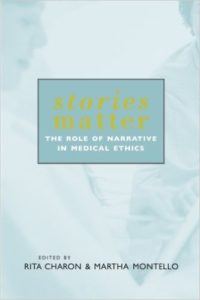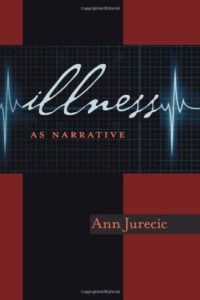 Stories Matter; Story Matters
Stories Matter; Story Matters
in health and illness
At the centre of the teaching of Narrative Medicine in medical schools (originally in the US but increasingly across the world) is the need for health professionals to understand relationships of caring as well as curing; to develop skills of attentive listening as well as diagnosing.
 At the centre of the International Conference on Narrative of Health and Illness (http://www.healthnarratives.org/; see http://www.artsandhumanities.org/conferences/international-conference-on-narrative-of-health-and-illnessprogramme/ & http://www.artsandhumanities.org/conferences/international-conference-on-narrative-of-health-and-illnessprogramme-day-2/) international gathering in La Laguna, Tenerife, was a network of stories of health and illness: –DIPEx http://www.dipexinternational.org/ which ‘conducts rigorous and systematic, qualitative research into people’s experiences of health and illness’ and Healthtalk.org, gathering People’s experiences of health
At the centre of the International Conference on Narrative of Health and Illness (http://www.healthnarratives.org/; see http://www.artsandhumanities.org/conferences/international-conference-on-narrative-of-health-and-illnessprogramme/ & http://www.artsandhumanities.org/conferences/international-conference-on-narrative-of-health-and-illnessprogramme-day-2/) international gathering in La Laguna, Tenerife, was a network of stories of health and illness: –DIPEx http://www.dipexinternational.org/ which ‘conducts rigorous and systematic, qualitative research into people’s experiences of health and illness’ and Healthtalk.org, gathering People’s experiences of health
So the meeting was a joyous gathering of medical professionals committed to disseminating their *qualitative* research – into stories of health and sickness.
Framing understandings
The s eminal books framing the project including Arthur Kleinman’s The Illness Narratives: Suffering, Healing, and The Human Condition which first pointed out that such stories – of those who, as Susan Sontag memorably said, hold citizenship in the kingdom of the ill’, for ‘illness is the night-side of life’ – beat the bounds of the human condition.
eminal books framing the project including Arthur Kleinman’s The Illness Narratives: Suffering, Healing, and The Human Condition which first pointed out that such stories – of those who, as Susan Sontag memorably said, hold citizenship in the kingdom of the ill’, for ‘illness is the night-side of life’ – beat the bounds of the human condition.
And Arthur Frank’s analysis of ‘sickness stories’ within the framework of narrative theory in The Wounded Storyteller:Body, Illness and Ethics, at this conference added to with a challenging and inspiring call to look to ‘companion stories’: from folk stories to classic literature, that act as companion support structures for individuals left alone by and in their illness (see http://www.artsandhumanities.org/uncategorized/conf-on-narrative-of-health-illnessarthur-franks-on-demoralisation-remoralisation/).
This was a call and challenge – as always from Arthur Frank – to go beyond ‘Medicine and Literature’ as medicine in literature/literature about medicine/medical training use of illness narratives and indeed Propp type research into the ‘deep structures’ of folk tales, to ask what literature is good for, for those in the exigencies of the human condition.
Why do ‘illness stories’ matter?
‘Narrative representations of health and illness offer a strong counter-balance to the dominant biomedical focus’ said the conference organisers (http://www.healthnarratives.org/) and this vital objective was everywhere demonstrated. Narrative Medicine courses are primarily aimed at the training of healthcare professionals, including in all branches of medicine. So many of the panels were literally exemplary: showing how [not] to talk to patients: ‘I had bad headaches and I was getting tired of telling this doctor’ (Maria Stubbe) and Learning to listen: Use of an illness narrative interview protocol to promote patient-centered care (Alicia Navarro de Souza).And a whole panel was dedicated to ‘What can research into patient experiences teach us about good communication in health care?’ ; the prize winning video “I like to know and make my own choices”. Personal Experiences of Severe Asthma: A Review (Eassey, Daniela; Pickles, Kristen; Reddel, Helen; Foster, Juliet; Smith., Lorraine) allowed the patients’ voices to come through vividly and informatively.
But more: many of the papers were concerned with changing treatments of and attitudes to certain conditions:mental health, chronic pain, dementia, inflammatory bowel disease; others with challenging public and public health care perceptions of, eg, complementary and alternative medicine, cannabis and, importantly, with combating stigma – Towards Reducing Stigma: New Media Mental Health Narratives (Michael Birch), A tale of two “burdens” – everyday morality and stigma resistance in narratives of type 2 diabetes and mild cognitive impairment (Tim Gomersall) and dismissive and stigmatising labels – eg Mónica Portillo et al’s video La empatía en la narrativa como herramienta de cambio en pacientes con Síndrome de Fibromialgia and On personal narratives, addiction and resistance (Anna Lydia Svalastog).
Challenging the frames
‘Disease interrupts a life, and illness then means living with perpetual interruption. … Telling an interrupted life requires a new kind of narrative’ (Arthur Frank, The Wounded Storyteller)
An interrupted life comes to what the Greeks called – both in the theatre and in medical textbooks – the krisis, the turning point. The conference showed that today as in Ancient Greece, stories of those interruptions, those crises, demarcate and beat the bounds of the human experience.
That is to say that in the accounts of the deficits of care in a critical and life-changing situation, much is also revealed about that life, about the life-story that has been interrupted. I was reminded of this forcefully in Lisa Hinton and colleagues’ “It’s not your baby, you know the baby belongs to the hospital”; parent narratives of neonatal surgery and recovery. For, illuminating as this is for all involved in neonatal care, it as also challenges as it illuminates what the presenters call the ‘lenses’ that could be focussed on the data: gender and identity theory, transitioning to parenthood, masculinity and more. For what the new parents were denied – autonomy, choice, a chance to bond, an imagined future [of parents of a vital baby] – showed nuanced facets of the transitions involved in motherhood beyond the hormonal and biomedical accounts of being ‘postpartum’, and fatherhood, beyond masculine definitions and self image.
Likewise, so many other papers had still-to-be-explored implications beyond medical practice, such as the similar facets of self and body image of Karen Groven and colleagues’ “I will claim that I am a very good success story”: gender and men’s narration of long- term experiences of WLS [weight loss surgery]; Spector-Mersel’s video Preserving a masculine self in face of illness and disability: The case of older Sabra men; Ahlsen chronic pain narratives, Palant et al inflammatory bowel disease, Lamerichs et al dementia care education and so very many more: all had implications outside medical sociology and clinical and other training.
For, as Brian Hurwitz said in his opening plenary,(see http://www.artsandhumanities.org/conferences/conf-on-narrative-of-health-illness-1st-thoughts/ -HURWITZ, COCHRANE & DOCTORS’ SHAME) ‘taking the history’ of a patient, constructing the case story, fell into disuse as an important clinical skill in favour of diagnostics, algorithms and collecting [and treating the patients as] data. But if conditions can be diagnosed and quantified, patients cannot: they are singular and  their condition affected by particulars. As Rita Charon showed in her introduction to Stories Matter: The Role of Narrative in Medical Ethics (Reflective Bioethics), the narratives, plural, of care and cure form a multifaceted case when crises or choices have to be made.
their condition affected by particulars. As Rita Charon showed in her introduction to Stories Matter: The Role of Narrative in Medical Ethics (Reflective Bioethics), the narratives, plural, of care and cure form a multifaceted case when crises or choices have to be made.
 Ann Jurecic in Illness as Narrative has pointed to the expansion and challenge to literary theory and narrative hermeneutics that Narrative Medicine has demanded of English studies, pointing to the complexities of ‘real life’ narrative presentation, of the implications of the evident (sic) cultural formation of narrative possibilities for humanistic understandings of such as ‘self’, of integrity, autonomy, will, ipseity and the interactions of mind and body.
Ann Jurecic in Illness as Narrative has pointed to the expansion and challenge to literary theory and narrative hermeneutics that Narrative Medicine has demanded of English studies, pointing to the complexities of ‘real life’ narrative presentation, of the implications of the evident (sic) cultural formation of narrative possibilities for humanistic understandings of such as ‘self’, of integrity, autonomy, will, ipseity and the interactions of mind and body.
Attending to the narratives of those whose lives have been ‘interrupted’ clearly demands a different narratological hermeneutic from studying the meaning-making in quasi fictional and/or autoethnographic ‘illness memoirs’ and from avowedly fictional accounts of such: they have personal, clinical as well as humanistic implications. For narratives of health and illness presented in this conference show the fracturing of a ‘sense of autonomous, narrative self’ in a way that complements or even, I would suggest, supersedes some of the literature used in Medical Humanities courses.(Literature discussed by Isabel Fernandes in The Challenges of the ‘new medicine’ and the place of narrative: see http://www.artsandhumanities.org/conferences/international-conference-on-narrative-of-health-and-illnessprogramme-day-2/)
So this is a call for all those presenting and involved in Patient Experience narrative gathering, to go beyond addressing the medical profession in their dissemination of material, results and implications. For this conference showed the need for Humanities, and humanity, as a whole to take up the multifaceted analysis and implications of illness stories.
Some of the papers were ‘Broken Narratives’ (as the papers presented at the ‘Broken Narratives and the Lived Body’ conference http://artsonline.monash.edu.au/broken-narratives/, some to be published shortly in a Special Issue of Arts and Humanities in Higher Education: an international journal of theory, research and practice Sage (http://ahh.sagepub.com)) – narratives constructed by the researcher of pain, of trauma, of disenvoicing conditions.
These also have implications for both medical and humanities research: trauma is popularly understood as disenvoicing; the now discredited condition ‘hysteria’ as being emotional distress written on the body. Nuanced accounts of the specifics of such disenvoicings can have implications for trauma and identity as well as dementia studies.
‘Brokered’ Narratives
Some of the papers presented what I want to describe as ‘brokered’ (rather than broken) narratives: of cases where care and/or cure broke down.Here the record of the patient experience can do more than call attention to the specifics of the breakdown, but rather provide an ethnography covering such factors as the power relations between the parties, the prejudices and prejudgments in play and the role of disenvoicing factors not sufficiently understood – fear, shame, the loss of autonomy and so much more, in being a patient.
After listening to and learning from so many stories, one session invited us, implicated us, in intervening.
Preben Friis and colleagues’ University of Southern Denmarks Theatre Lab, as Boal’s Forum Theatre as explained in Rogelio Altisent and colleagues’ ‘Teatro-Foro: una metodología innovadora para aprender ética‘, set up a scenario: a man with chronic back pain, seen interacting with his doctor and then, decisively, with his daughter who decides he shouldn’t/can’t look after his beloved grandchildren any more. What is this situation about?What intervention is needed? Some said, the back pain, some the disabling effect of the back pain, some the drugs prescribed – and so advised his being referred to a pain clinic.
Others pointed to the irremediable psychosocial effects of the chronic condition, of accepting or refusing to accept (and so being marked down as a ‘resistant’ or ‘non compliant’ patient) more referrals. Still others saw ‘the problem’ as intergenerational and interpersonal – of the daughter/father roles being reversed and/or as a power struggle over the grandchildren.
Many heated interventions, many impressive scenarios later (played out with audience members) we were left [not just] understanding some of the ramifications of a ‘typical lower back pain chronic patient’ but also the different readings and interventions to be chosen from, the different stories in which we had intervened, the different stories we had stopped being told, as each course precluded others and had, sometimes unappreciated, consequences in terms of interpersonal and family relationship and/or sense of autonomy and selfhood in the teeth of aging.
Do the medical professionals sometimes demand that we go compliantly into serious illness and ‘gentle into that dark night’?
‘Do not go gentle into that good night’ by Dylan Thomas
Do not go gentle into that good night,
Old age should burn and rave at close of day;
Rage, rage against the dying of the light.
Though wise men at their end know dark is right,
Because their words had forked no lightning they
Do not go gentle into that good night.
Good men, the last wave by, crying how bright
Their frail deeds might have danced in a green bay,
Rage, rage against the dying of the light.
Wild men who caught and sang the sun in flight,
And learn, too late, they grieved it on its way,
Do not go gentle into that good night.
Grave men, near death, who see with blinding sight
Blind eyes could blaze like meteors and be gay,
Rage, rage against the dying of the light.
